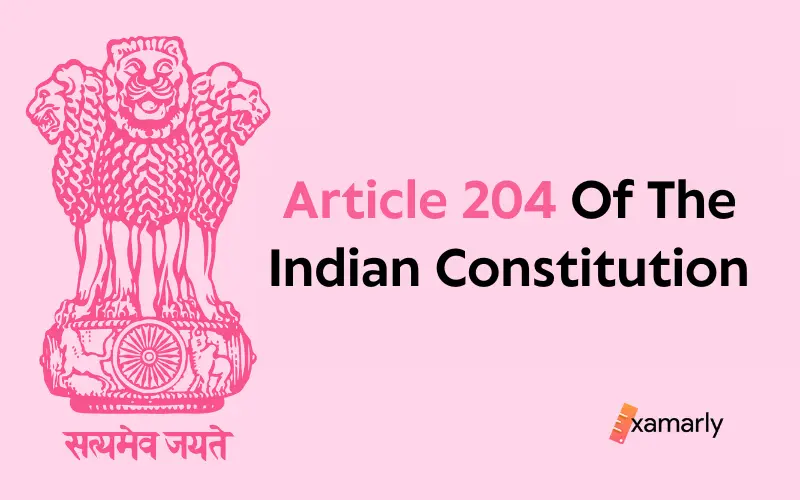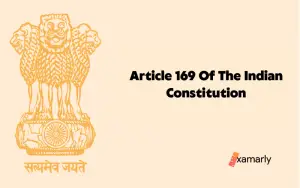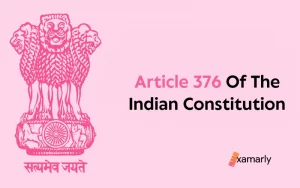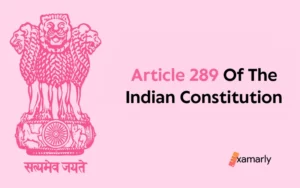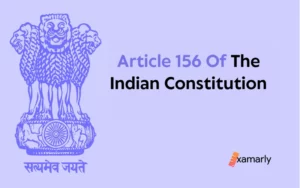Article 204 of the Indian Constitution brings in the third step related to the yearly budget of the States, that is, the withdrawal of money. After the Annual Financial Statement and grants are made, it is with the help of the Appropriation Bills that money can be withdrawn from the Consolidated Fund of the State.
The process of appropriating funds from the Consolidated Fund of a state is an important aspect of financial management and accountability. While understanding Article 204, we will explore the rules and procedures for appropriating funds in order to meet grants and expenditures.
We will also discuss the limitations on amendments to the relevant Bill and the conditions for withdrawing money from the Consolidated Fund.
Let’s learn how the States receive the money they require for their expenditures elaborately.
Background of Article 204 of the Indian Constitution
Before getting into an elaborate understanding of Article 204 of the Indian Constitution, let’s read about its background in precise.
Draft Article 179 (Article 204) was debated on 10th June 1949 which introduced the procedure for the passage of Appropriation Bills in order to withdraw money from the Consolidated Fund of the State.
Earlier, Article 179 of the Draft Consitution (1948) stated:
(1) The Governor shall authenticate by his signature a schedule specifying-
(a) The grants made by the Assembly under the last preceding article;
(b) The several sums required to meet the expenditure charged on the revenues of the State, but not exceeding in any case, the sum shown in the statement previously laid before the House or Houses.
(2) The schedule so authenticated shall be laid before the Assembly but shall not be open to discussion or vote in the Legislature.
(3) Subject to the provisions of the next two succeeding articles, no expenditure from the revenues of the State shall be deemed to be duly authorised unless it is specified in the schedule so authenticated.
The Draft Article gave primacy to the Governor and only he could authenticate the Schedule. The Drafting Committee proposed to give the power to the State Legislature and hence, the Chairman of the Drafting Committee moved an amendment to wholly replace the Article with the clauses existing today as Article 204. The amendment was assented to without any debate and adopted on the same day.
Article 204 of the Indian Constitution – Appropriation Bills
After learning about the provisions and procedures to present the budget before the House or Houses of the Legislature of the State in the form of Annual Financial Statement and Demands For Grants, in Article 204 Of The Indian Constitution, we will read about the procedures for withdrawing the sanctioned money.
For a clearer insight into Appropriation Bills, let’s look at the clauses and what they state.
Clause 1 – As it is & Explained
(1) As soon as may be after the grants under article 203 have been made by the Assembly, there shall be introduced a Bill to provide for the appropriation out of the Consolidated Fund of the State of all moneys required to meet—
(a) the grants so made by the Assembly; and
(b) the expenditure charged on the Consolidated Fund of the State but not exceeding in any case the amount shown in the statement previously laid before the House or Houses.
Article 204 of the Indian Constitution, in its first clause, introduces the Appropriation Bill which is required to provide the amount of money out of Consolidated Fund of the State.
After the grants are passed by the Assembly, as said in Article 203, a Bill is introduced in order to take the process further and approve the withdrawal of money.
Having said that, before the Bill is passed it must be made sure it includes only those grants approved by the Assembly and that the amount does not exceed the estimated expenditure shown in the Annual Financial Statement.
Clause 2 – As it is & Explained
(2) No amendment shall be proposed to any such Bill in the House or either House of the Legislature of the State which will have the effect of varying the amount or altering the destination of any grant so made or of varying the amount of any expenditure charged on the Consolidated Fund of the State, and the decision of the person presiding as to whether an amendment is inadmissible under this clause shall be final.
The second clause states that no changes can be proposed to the House of the Legislature of the State that would alter the amount of the grants being given or change their intended purposes, or any amendment that would change the amount of money being charged to the Consolidated Fund.
The person presiding over the legislative proceedings, such as the Speaker or the Deputy Speaker of the house or a Chairman has the final say on whether an amendment is acceptable under this provision.
Clause 3 – As it is & Explained
(3) Subject to the provisions of articles 205 and 206, no money shall be withdrawn from the Consolidated Fund of the State except under appropriation made by law passed in accordance with the provisions of this article.
This clause says that no money can be taken out of the Consolidated Fund except through a process called appropriation.
This includes the Annual Financial Statement, the demands for grants assented by the Assembly as well as the grants that fall under the provisions of Articles 205 and 206, such as Supplementary Grants, Additional Grants, Exceptional Grants, etc.
Conclusion
Article 204 of the Indian Constitution elaborates on the process for appropriating funds from the Consolidated Fund of the State to meet certain grants and expenditures.
A Bill is introduced for this purpose, and amendments that would alter the amount or destination of the grants or expenditures are not allowed. The person presiding over the legislative proceedings has the final say on whether an amendment is admissible.
Adding to that, the third clause clears that money can only be withdrawn from the Consolidated Fund through the Appropriation Bill passed in accordance with provisions specified in Article 204, subject to the provisions of Articles 205 and 206.
Related Articles:
FAQs Related to Article 204 of the Indian Constitution
What is “Appropriation”?
Appropriation refers to the allocation of funds for a specific purpose. In this context, it refers to the withdrawal of money required to meet the yearly estimates of expenditure and grants of a State that is charged upon the Consolidated Fund of the State.
What is the purpose of Appropriation Bills?
The Bill is introduced to provide for the appropriation of funds from the Consolidated Fund of the state to meet the grants made by the Assembly and the expenditure charged to the Consolidated Fund.
Can amendments be made to this Bill?
No, amendments that would vary the amount or destination of the grants or expenditure charged to the Consolidated Fund are not allowed, and the decision of the person presiding over the legislative proceedings is final on this matter.
Can money be withdrawn from the Consolidated Fund without the Bill being passed?
No, money can only be withdrawn from the Consolidated Fund after an Appropriation Bill is passed according to the provisions defined in Article 204 of the Indian Constitution.
What is the Consolidated Fund of the State?
The Consolidated Fund of the state is a central fund used for the state’s financial transactions, including the storage and management of revenue and expenditure.


